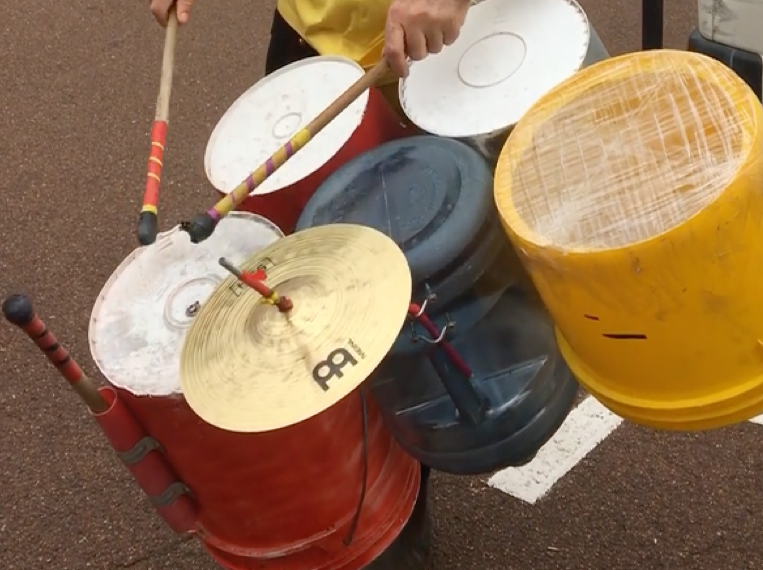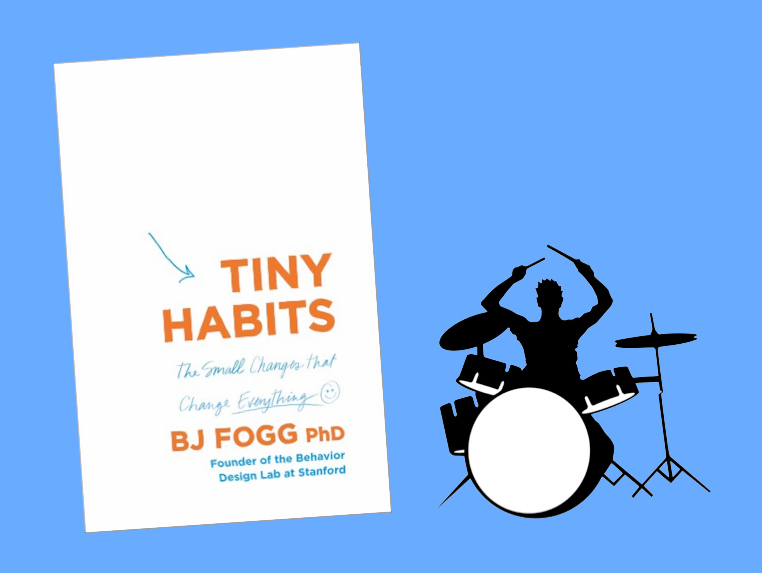It’s important to have some sort of creative outlet in life.
And I’ve recently discovered a new one – playing the drums.
As Nat’s What I Reckon says in his brilliant book Uncook Yourself: A Ratbag’s Rules for Life:
“The drums – oh my god. There’s something about going BOOM, BAM, CRASH that makes me feel like a champion.”
He’s spot on.
Drumming gives you this incredible sense of power.
The great thing is you don’t need to spend hundreds of dollars on a drum set or take lessons for years and years to learn how to play the drums. You can learn on a budget and best of all, you can learn fast.
Drummer Dave Grohl (member of Nirvana and creator of the Foo Fighters) is a perfect example of this. When Dave was learning how to play the drums as a teenager, he used fat marching sticks as drum sticks, set up pillows in the formation of a drum set and practised on that.
So before you go spending big bucks on a drum kit, it’s a good idea to be resourceful like Dave. Make do with what you’ve got.
This is what I did. I created my own drum kit with plastic buckets, an old water drum, broken symbols (to create a snare) and a karate belt (to tie around my waist).

Trust me, you can still make a lot of noise and have a heap of fun on a homemade drum kit.
How I learnt to play the drums
It took less than 20 hours to go from being a total amateur to reasonably good at playing the basics on my drums.
How did I master the basics?
Here’s what I did . . .
1. Finding the right teacher
When it comes to acquiring a new skill, Google, YouTube tutorials and online courses can help a lot. But when it came to drumming, I felt overwhelmed by all the resources online. I knew I needed special help, guidance and real time feedback from a teacher.
Luckily, I met someone who could teach me. My teacher was a self taught drummer who made his own drum kit and sticks out of recycled materials.
He showed me how to make my own drum kit and taught me a number of rhythms. I recorded him playing these rhythms so I could go back and practice while watching them.

2. Clear away distractions
If I wanted to learn the drums quickly, I knew I had to focus. If I was checking my phone every few minutes, it would mess with my ability to learn. Before every practice session, I would put my phone away (in a box in another room) so I could give drumming my full attention.
3. Dual coding: Drawing pictures
Visuals are incredibly powerful. As I watched the videos of my teacher playing, I dissected each rhythm by drawing pictures and making notes (e.g. “Bass, then snare, bass and then double snare”).
4. Memory techniques
One of the rhythms I had to learn was called ‘Dingo’. It involves a vocal component of ‘Hey!’ and ‘Ho!’. To memorise this, I would imagine a dingo running around scaring my chickens, and me yelling at the dingo ‘Hey!’.
5. Active recall (testing myself)
Once I had dual coded each rhythm, I would test myself. Before clicking play on the videos, I’d call out the name of a rhythm and have a shot at playing it. Then I’d check the video to see how I went. I made notes of any parts I needed to tweak and improve.
6. Interleaving
There were a number of different rhythms to learn and each one had a different name. Instead of just practicing one rhythm until I got it perfect, I would mix it up in a practice session. I would jump back and forth between different rhythms (this is what I had to do in real life).
Why did I do this? Because research shows that when you interleave it leads to more durable and flexible learning.
7. Creating a Tiny Habit

My life is pretty jam packed with activity so I needed something to remind me to practice – tiny habits would do the trick!
Creator of the Tiny Habits method Professor BJ Fogg says:
“With the Tiny Habits method, you focus on small actions that you can do in less than thirty seconds. You will quickly wire in new habits, and then they will grow naturally.”
I developed the following tiny habit to help wire in the habit of drumming after dinner:
After I put my dish in the sink, I will pick up my drum sticks.
8. Practice, practice, practice!
For the first couple of weeks, I practiced every day for at least 2 minutes. If I felt like doing more, I would but that was considered a bonus extra.
I knew those little chunks of practice would add up to something solid and help me wire in the habit of drumming. And they certainly did.
If I didn’t have access to my drums, I would practice drumming on my thighs or a table.
9. Drumming with others
Like anything in life, it’s more fun drumming with others. I convinced my husband to learn the drums with me. We’d give each other feedback and encourage each other. It was often the case that when my motivation was low, my husband had a little more motivation in the tank (and vice versa). We fed off each others energy.
Then we started drumming in a group with other beginners and wow – it sounded incredible! We felt empowered playing the drums and that made us want to practice even more.

10. Having the courage to learn
When you take on learning a new skill, you need to step out of your comfort zone. And that requires courage. I had to get comfortable with the fact that I was going to suck at drumming for a period of time.
As psychologist Dr Ross Ellenhorn says:
“Speaking your first words requires courage. Taking your first step requires courage. Making friends requires courage too. Leaving home requires courage, getting a job requires courage, working toward a promotion requires courage . . . All these things require courage (some a little, many a lot) because you don’t grow automatically; you grow by deciding and choosing. And deciding and choosing are dizzying, scary things to do.”
We need to remind ourselves that all professionals started out as grossly incompetent. But the only way to go from being an amateur to good is to keep going.
To sum up
Drumming may not be your shtick. And that’s okay. I never thought drumming would be for me until I tried it. And now I love it and I can’t stop!
You can apply these strategies to help you master any skill, whether it be learning a new language or how to cook a complex dish.
The key is to start thinking more strategically about how you can make your learning experience more enjoyable and effective. With the right approach and mindset, you’ll begin to see results quickly. And this will help boost your confidence and motivation to keep learning.


